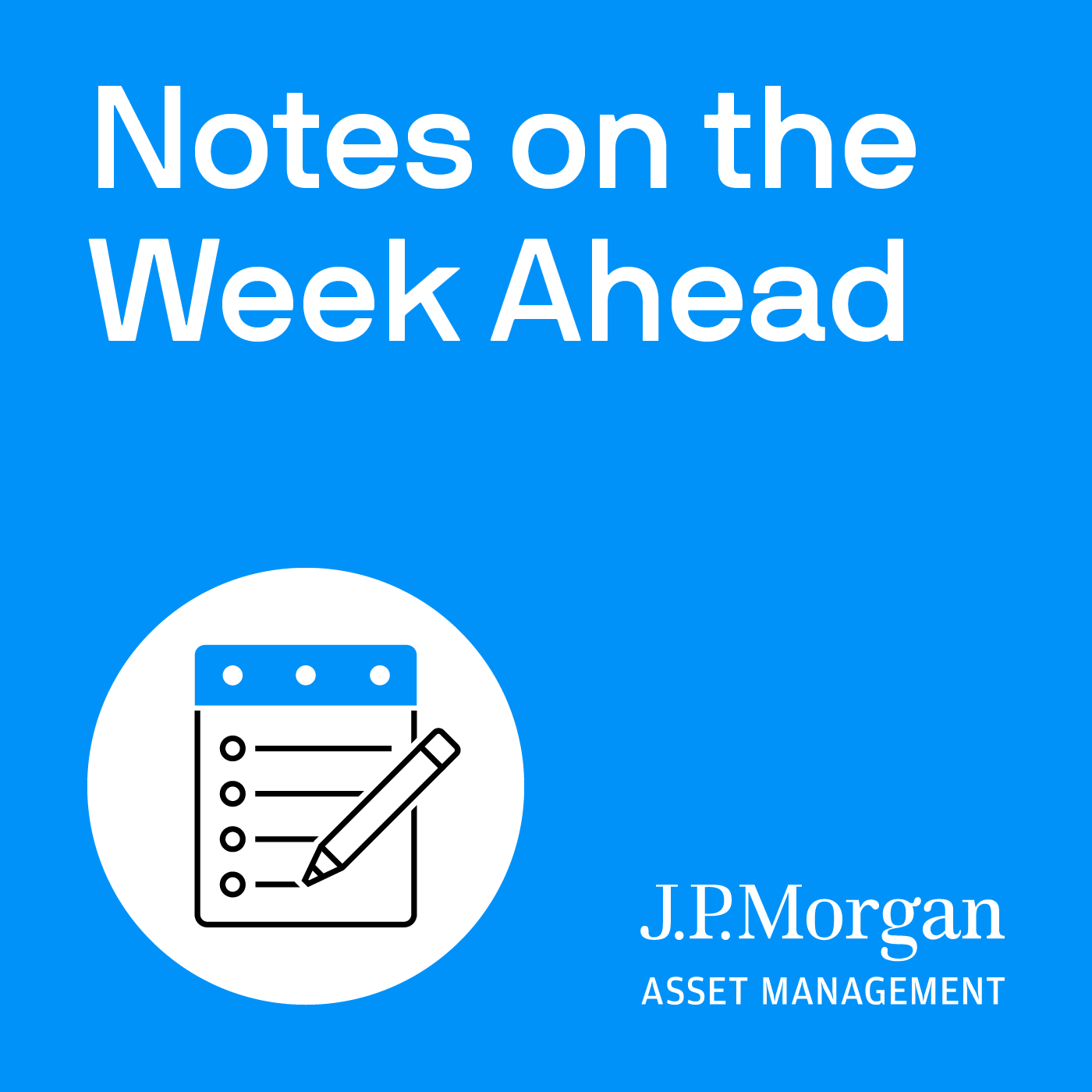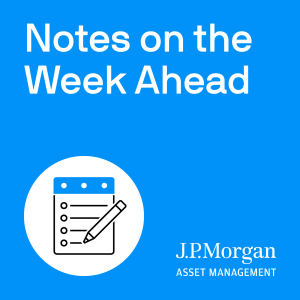
Listen to the latest insights from Dr. David Kelly, Chief Global Strategist at J.P. Morgan Asset Management to help prepare you for the week ahead.
Listen to the latest insights from Dr. David Kelly, Chief Global Strategist at J.P. Morgan Asset Management to help prepare you for the week ahead.
Episodes

Monday May 19, 2025
Policy and the Investment Landscape: An Update
Monday May 19, 2025
Monday May 19, 2025
This week, after a very busy few months, I am putting down my pen, picking up my metaphorical spade and bucket and taking some vacation time. 2025, so far, has been a challenging year for analysts and it is tempting, as I’m trying to clear my desk, to assert that not much has changed over the past few weeks and so I don’t need to update any analysis of federal government policy, the economy and markets. However, the reality is that events in Washington and on Wall Street over just the last two weeks do require a reassessment.

Monday May 05, 2025
A Softer Sort of Slowdown
Monday May 05, 2025
Monday May 05, 2025
There have only been two U.S. recessions since 2001 – the Great Financial Crisis and the Pandemic Recession. Both of these were huge – accounting for two of the only three times since the 1940s that the unemployment rate has vaulted to double digits. However, because the recessions of our recent memory have been so dramatic, investors may not appreciate the risks from a softer sort of slowdown.

Monday Apr 28, 2025
Tracking the Economic Slowdown
Monday Apr 28, 2025
Monday Apr 28, 2025
A crowd is gathered around the sickbed of the economic expansion. Among the multitude are the workers, consumers and business people who would be most impacted by its demise. There are political partisans too, some fervently praying for recovery, others quietly hoping for the opposite. At the foot of the bed are fiscal and monetary doctors, the former preparing a sugary solution to inject into the patient and the latter casting nervous eyes both on the patient and the fiscal doctors, concerned about a renewal of inflationary fever. Foreign governments and central bankers also stand vigil, from as safe a distance as they can manage, conscious of the infectious nature of the patient’s disease. And close by the door are investors, contemplating a quick exit from American assets but haunted by the memory of the many past remarkable American recoveries. There is a knock at the door. It is the last week in April and a battery of tests are in that should shed further light on the delicate health of the economic expansion.

Monday Apr 21, 2025
Recession Risks, Resilience and American Exceptionalism
Monday Apr 21, 2025
Monday Apr 21, 2025
Last weekend, I neglected to finish my Notes on the Week Ahead as I got caught up in watching the Masters. In truth, it was mostly a battle between Rory McIlroy’s emotions, which produced two double-bogeys in his final round, and his exceptional skill, which propelled his second playoff shot to within three feet of the hole. I was particularly happy to see his victory since he hails from the same island as myself, But I was also glad to see him win because, at 35, he is no longer in the first blush of youth. It is a sad truth that in athletics, as in life, no-one soars forever. Twenty years from now, McIlroy will probably still be a fine golfer – training and resilience should see to that. But he may no longer be exceptional.

Monday Apr 07, 2025
Tariff Turmoil and Investment Strategy
Monday Apr 07, 2025
Monday Apr 07, 2025
One clear advantage of getting older, (and I can attest to many of its disadvantages), is that you learn from experience. The financial market chaos, following the President’s tariff announcement, is different from previous market slumps. Every market selloff is. However, a common thread in all crises is that the best decisions begin with a structured approach to analysis.

Monday Mar 24, 2025
Fiscal Fudge
Monday Mar 24, 2025
Monday Mar 24, 2025
I may have mentioned this before, but as a young lad, I had a very healthy appetite. Consequently, when deciding on a hobby, I prudently elected to go with “cooking”. My experiments included making fudge and my mother dutifully supplied me with sugar, vanilla and helpful advice. However, we possessed no candy thermometer and, as anyone in the fudge-making business will tell you, getting the temperature right is essential. Too hot and you end up with toffee or hard caramel. Too cold and you end up with a grim sludge, which no degree of refrigeration can render palatable. Making fudge is a delicate operation.

Monday Mar 17, 2025
The Wait and See Economy
Monday Mar 17, 2025
Monday Mar 17, 2025
I was running along the roads of our neighborhood last weekend when I came upon a small herd of deer. I often see these beautiful but dopey creatures at dawn as they wander aimlessly in the middle of the road. When a car or truck bears down on them, they stop and stare. Perhaps they are pondering whether it would be more fun to hop into the woods to their right or gambol off into the field to their left. But, of course, the only important decision is to get out of the road. A “wait and see” attitude could be fatal.

Monday Mar 03, 2025
The Trouble with Tariffs
Monday Mar 03, 2025
Monday Mar 03, 2025
I was at a conference last week and a financial advisor asked me what I thought he should say when a client asked him what was so bad about tariffs.
It’s a fair question. Many people who instinctively believe in free trade would still have a hard time in clearly explaining the trouble with tariffs. And since tariffs are likely to be a big issue this week, with the president promising to impose postponed 25% tariffs on Mexico and Canada and a new, second 10% tariff on China as of March 4th, it seems like a good time to review the problem.

Monday Feb 24, 2025
The Implications of Slowing Population Growth
Monday Feb 24, 2025
Monday Feb 24, 2025
In December, the Census Bureau announced that the U.S. population had grown by nearly 1% in the year ended July 1st, 2024, marking the strongest annual gain since 2001[1]. Given this, it seems strange to be already talking about slowing population growth. However, the reality is that the gap between births and deaths is continuing to shrink, with almost all of our recent population growth coming from immigration. Going forward, if immigration is dramatically curtailed, overall population growth could turn negative by the middle of the next decade while the working-age population would immediately start to contract.
[1] See Net International Migration Drives Highest U.S. Population Growth in Decades, U.S. Census Press Release, December 19th, 2024.

Tuesday Feb 18, 2025
The Growth Drag from Policy Uncertainty
Tuesday Feb 18, 2025
Tuesday Feb 18, 2025
In the four weeks since he took office, the president has issued an extraordinary number of executive orders, while promising dramatic change across the full reach of the federal government. While these policy moves have broad political, geopolitical and social implications, for investors, the most important concern tariffs, immigration, the federal workforce and the federal budget.
The rapid pace of these moves, along with frequent reversals, court challenges and mixed signals on future policy actions, make it difficult for economists to assess their cumulative effects. Also important, and even harder to analyze, is the potential for policy uncertainty to delay business decisions. Much has been said about the potential for the new administration’s policies to add to inflation pressures. However, investors should also consider how these actions, and the uncertainty surrounding them, could slow economic growth.
